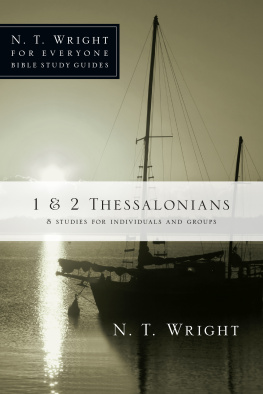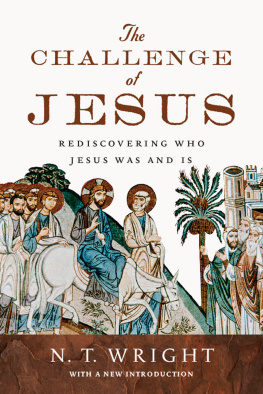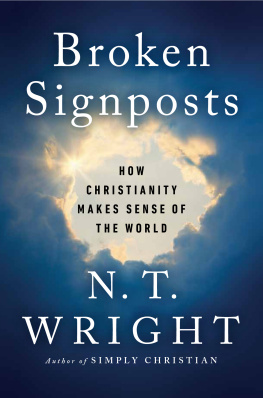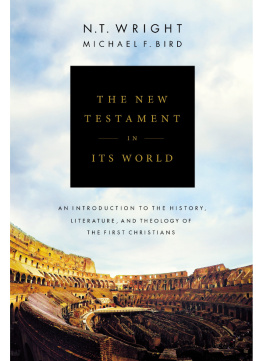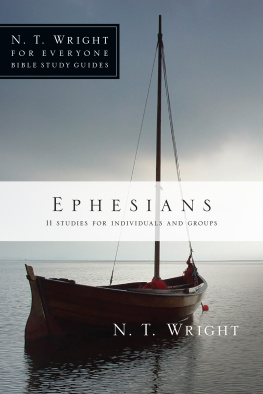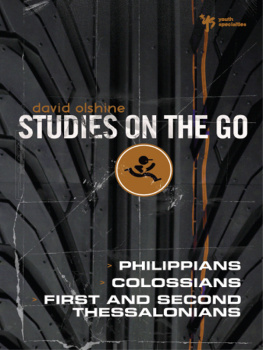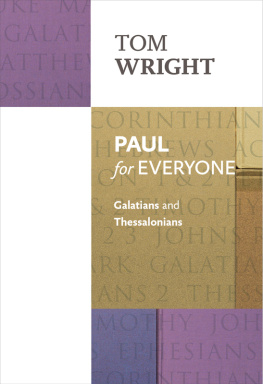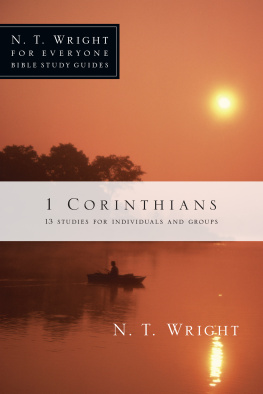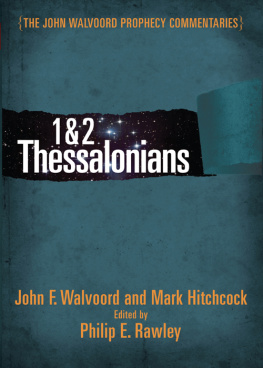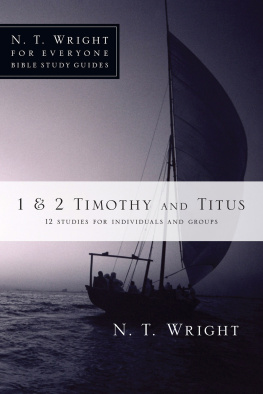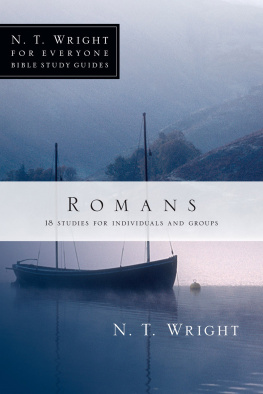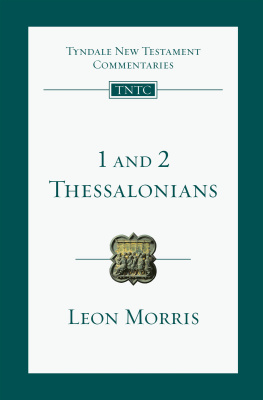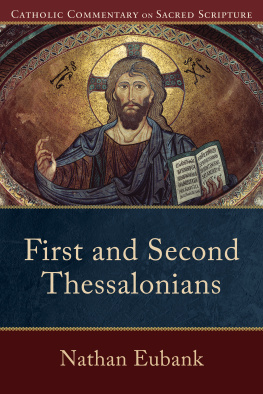Sommaire
Pagination de ldition papier
Guide
1 & 2 THESSALONIANS
8 STUDIES FOR INDIVIDUALS AND GROUPS
N. T. WRIGHT
WITH PATTY PELL
InterVarsity Press
P.O. Box 1400, Downers Grove, IL 60515-1426
ivpress.com
2009 by Nicholas Thomas Wright
All rights reserved. No part of this book may be reproduced in any form without written permission from InterVarsity Press.
This study guide is based on and includes excerpts adapted from Paul for Everyone: Galatians and Thessalonians, 2002 Nicholas Thomas Wright. All Scripture quotations, unless otherwise indicated, are taken from the New Testament for Everyone. Copyright 2001-2008 by Nicholas Thomas Wright. Used by permission of SPCK, London. All rights reserved.
InterVarsity Press is the book-publishing division of InterVarsity Christian Fellowship/USA, a movement of students and faculty active on campus at hundreds of universities, colleges and schools of nursing in the United States of America, and a member movement of the International Fellowship of Evangelical Students. For information about local and regional activities, visit intervarsity.org.
Cover design: Cindy Kiple
Cover image: Clipart.com
ISBN 978-0-8308-6923-7 (digital)
ISBN 978-0-8308-2193-8 (print)
This digital document has been produced by Nord Compo.
GETTING THE MOST
OUT OF THESSALONIANS
I hesitated long over the decision. I had to make up my mind whether to admit to the university a student whose grades were not quite as high as we would normally require. She was clearly intelligent, and capable of hard work, but why were some of the grades just a little bit lower than we had expected?
Then I thought back to the interview my colleagues and I had had with the student. She had come alive. She was clearly not only interested in the subject, but enthusiastic, and able to take in new ideas and make them her own. Remembering those first impressions vividly, I made the decision. We would admit her to the college. Three years later I was vindicated: she graduated with top honors.
Paul vividly remembers his first impressions of the Thessalonian Christians to whom he writes. (The story of his encounter can be read in .) They would suddenly understand what he was saying. It would grasp their hearts and minds. Paul and his companions, explaining the gospel to them, would become excited as they saw the message take hold, make sense, and begin its work of transforming hearts and lives. That memory lingered on even though Paul, Silvanus and Timothy had moved south, to Beroea, Athens and now Corinth. (Paul doesnt say so in the letter, but it is likely that he was writing this from Corinth, where he stayed for over two years.)
Pauls two letters to the Thessalonians are among the first, perhaps the very first, that Paul wrote to the young churches of the Mediterranean. (For more on them, also see my Paul for Everyone: Galatians and Thessalonians, published by SPCK and Westminster John Knox. This guide is based on that book and was prepared with the help of Patty Pell, for which I am grateful.)
Therefore, these letters are among the very earliest documents we possess from the beginning of the churchs existence. They are already full of life, bubbling with energy, with questions, problems, excitement, danger, and, above all, a sense of the presence and power of the living God, who has changed the world through Jesus and is now at work in a new way by his Spirit. Those same qualities can touch us as well as we delve more deeply into them.
SUGGESTIONS FOR INDIVIDUAL STUDY
. As you begin each study, pray that God will speak to you through his Word.
. Read the introduction to the study and respond to the Open question that follows it. This is designed to help you get into the theme of the study.
. Read and reread the Bible passage to be studied. Each study is designed to help you consider the meaning of the passage in its context. The commentary and questions in this guide are based on my own translation of each passage found in the companion volume to this guide in the For Everyone series on the New Testament (published by SPCK and Westminster John Knox).
. Write your answers to the questions in the spaces provided or in a personal journal. Each study includes three types of questions: observation questions, which ask about the basic facts in the passage; interpretation questions, which delve into the meaning of the passage; and application questions, which help you discover the implications of the text for growing in Christ. Writing out your responses can bring clarity and deeper understanding of yourself and of Gods Word.
. Each session features selected comments from the For Everyone series. These notes provide further biblical and cultural background and contextual information. They are designed not to answer the questions for you but to help you along as you study the Bible for yourself. For even more reflections on each passage, you may wish to have on hand a copy of the companion volume from the For Everyone series as you work through this study guide.
. Use the guidelines in the Pray section to focus on God, thanking him for what you have learned and praying about the applications that have come to mind.
SUGGESTIONS FOR GROUP MEMBERS
. Come to the study prepared. Follow the suggestions for individual study mentioned above. You will find that careful preparation will greatly enrich your time spent in group discussion.
. Be willing to participate in the discussion. The leader of your group will not be lecturing. Instead, she or he will be asking the questions found in this guide and encouraging the members of the group to discuss what they have learned.
. Stick to the topic being discussed. These studies focus on a particular passage of Scripture. Only rarely should you refer to other portions of the Bible or outside sources. This allows for everyone to participate on equal ground and for in-depth study.
. Be sensitive to the other members of the group. Listen attentively when they describe what they have learned. You may be surprised by their insights! Each question assumes a variety of answers. Many questions do not have right answers, particularly questions that aim at meaning or application. Instead the questions push us to explore the passage more thoroughly.
When possible, link what you say to the comments of others. Also, be affirming whenever you can. This will encourage some of the more hesitant members of the group to participate.
. Be careful not to dominate the discussion. We are sometimes so eager to express our thoughts that we leave too little opportunity for others to respond. By all means participate! But allow others to also.
. Expect God to teach you through the passage being discussed and through the other members of the group. Pray that you will have an enjoyable and profitable time together, but also that as a result of the study you will find ways that you can take action individually and/or as a group.

